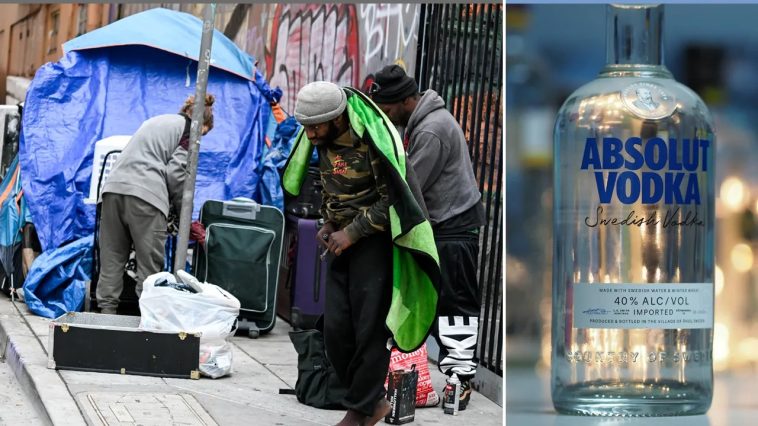In a forward-thinking attempt to address the problem of chronic alcoholism among San Francisco’s homeless population, a pilot program has been introduced which offers monitored alcoholic beverage consumption, employing tax-based funding. The initiative, coined the ‘Managed Alcohol Program’, is an endeavor executed by San Francisco’s Department of Public Health and aims to regulate alcoholic intake for those grappling with addiction and homelessness.
Rooted in compassion and a proactive approach, its goal is to reduce pressure on the city’s emergency services and help the homeless population settle down. The argument against this innovative approach, however, revolves around the notion that public funds might be better invested in permanent solutions such as rehabilitation and sober living programs.
The concept of a Managed Alcohol Program (MAP) is not new. The California Health Care Foundation, referencing countries like Canada and Australia, outlined that such a service is provided by trained healthcare professionals within controlled environments such as homeless shelters or transitional homes. By controlling the intake of alcohol, they seek to prevent dangerous withdrawal symptoms including seizures and injuries. This careful balancing act of supply in the context of addiction, is to protect those most vulnerable, particularly in the public health sphere.
The MAP in San Francisco was established amid the COVID-19 pandemic, particularly focusing on homeless individuals placed in isolation in hotel rooms to safeguard them from severe alcohol withdrawal. Originally, only a 10-bed facility, it has since been escalated into a 20-bed operation housed in a former Tenderloin district hotel, seeing an annual budget increase to a reported $5 million.
Alice Moughamian, the Nurse Manager of the Managed Alcohol Program, clarified that the program furnishes participants with a motel room, three meals a day, and alcohol doses calculated precisely to cater to their addiction needs while maintaining safety. The measured success of stabilizing alcoholic patients has led to the expansion of the program, with a focus on supporting the Latinx and indigenous demographic, plus additional support at the city’s traditional sobering center.
According to Bryce Bridge, a social worker integral to the project, the program’s procedure involves assessing clients to understand their individual needs once they are identified as suffering from alcohol-related disorders. Services extend beyond mere alcohol provision; clients are linked to a primary care doctor, enabled in obtaining necessary identification, and given assistance with mental health care, on-site wellness activities, and other reputable treatments.
Bridge noted that the program also frequently collaborates with local community organizations to facilitate creative outlets for participants, such as art and poetry groups. The goal here is to encourage healthier forms of expression among the program participants. Bridge acknowledged that marijuana usage was common among clients, and no existing policy ruled out marijuana consumption. Nevertheless, the health implications and potential for interpersonal conflicts of marijuana usage are closely monitored.
The program has recently caught the public eye following scathing online commentary by Adam Nathan, CEO of an AI company and chair of the San Francisco Salvation Army. Nathan described witnessing the provision of free beer to homeless residents grappling with Alcohol Use Disorder (AUD) at one of the program’s location. As an organization, the Salvation Army encourages abstaining from alcohol, offering rehabilitation programs for free.
In response to Nathan’s allegations, public health officials asserted that some of his claims lacked context. Commenting to the San Francisco Chronicle, they clarified that alcohol is dispensed only by nurses and the program isn’t accessible for non-participating homeless individuals to gain a free drink. Supporting their statement, they added that although the program is housed in a former hotel with an existing bar, the on-site taps are idle and unutilized.
Despite its progressive intentions, the Managed Alcohol Program has not escaped criticism from prominent city figures, including San Francisco Mayor London Breed. Mayor Breed voiced her concerns in February, suggesting that the program could be exacerbating the problem rather than reducing harm. Echoing her sentiments, Tom Wolf, a recovered heroin addict, openly questioned the program’s long-term sustainability paid for by public money.
Nurse Manager Moughamian defended the approach of the program, emphasizing that the end goal is not aimed at reducing alcohol use or achieving total abstinence. Rather, the mission is to alleviate the various health, legal, and social issues connected to hazardous alcohol consumption. Success, from Moughamian’s view, isn’t measured in terms of recovery but in harm reduction.
Public health officials celebrate the program for reportedly saving $1.7 million over six months due to decrements in hospital visits and distress calls from program participants. They share that visits to the sobering center reduced by 92%, emergency room visits saw a decline of over 70%, and both EMS calls and hospital visits were halved.
In fact, San Francisco city officials claim that the treatment of merely five residents with alcohol addiction issues had previously cost the city more than $4 million, considering ambulatory erstwhile services over five years. This surge involved almost 2,000 ambulance transports, highlighting the demand for alternative strategies in tackling addiction amongst the city’s homeless population.
Singing praises of the program, the San Francisco Fire Department has acknowledged the undeniable impact of this intervention at reducing the burden on emergency services. They argue it caters to a ‘small but highly vulnerable population’ which traditionally places a substantial drain on public resources.
Overseas, countries like Canada, Portugal, and the U.K. have embraced Managed Alcohol Programs far more comprehensively than the U.S. For instance, Canada hosts over 40 such initiatives, as per the University of Victoria’s Canadian Institute for Substance Use Research. Research from 2022 also suggests a promising trend – homeless individuals with severe alcoholism participating in Canadian MAPs faced a lower risk of death and experienced fewer hospital stays.


